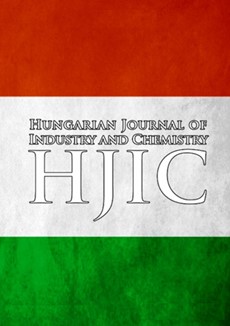Hydrogen Sulphide Corrosion of Carbon and Stainless Steel Alloys Immersed in Mixtures of Renewable Fuel Sources and Tested under Co-processing Conditions
DOI:
https://doi.org/10.1515/hjic-2016-0007Keywords:
Hydrogen sulphide corrosion, gas phase corrosion, carbon and high alloy steels, renewable biofuels, used cooking oil, animal waste lardAbstract
In accordance with modern regulations and directives, the use of renewable biomass materials as precursors for the production of fuels for transportation purposes is to be strictly followed. Even though, there are problems related to processing, storage and handling in wide range of subsequent uses, since there must be a limit to the ratio of biofuels mixed with mineral raw materials. As a key factor with regards to these biomass sources pose a great risk of causing multiple forms of corrosion both to metallic and non-metallic structural materials. To assess the degree of corrosion risk to a variety of engineering alloys like low-carbon and stainless steels widely used as structural metals, this work is dedicated to investigating corrosion rates of economically reasonable engineering steel alloys in mixtures of raw gas oil and renewable biomass fuel sources under typical coprocessing conditions. To model a desulphurising refining process, corrosion tests were carried out with raw mineral gasoline and its mixture with used cooking oil and animal waste lard in relative quantities of 10% (g/g). Co-processing was simulated by batch-reactor laboratory experiments. Experiments were performed at temperatures between 200 and 300 ºC and a pressure in the gas phase of 90 bar containing 2% (m3/m3) hydrogen sulphide. The time span of individual tests were varied between 1 and 21 days so that we can conclude about changes in the reaction rates against time exposure of and extrapolate for longer periods of exposure. Initial and integral corrosion rates were defined by a weight loss method on standard size of coupons of all sorts of steel alloys. Corrosion rates of carbon steels indicated a linear increase with temperature and little variation with composition of the biomass fuel sources. Apparent activation energies over the first 24-hour period remained moderate, varying between 35.5 and 50.3 kJ mol-1. Scales developed on carbon steels at higher temperatures were less susceptible to spall and detach. Nonetheless, moderate deceleration of corrosion rates as a function of time are due to the less coherent, frequently spalling and low compactness, higher porosity of the scales evolved at lower and higher temperatures, respectively. On the surface of high alloy steels, sulphide scales of an enhanced barrier nature formed during the induction periods and the layer formation mechanism was found to be assisted by the increasing temperature as initial reaction rates considerably decreased over time. Nevertheless, corrosion-related sulphide conversion of metals and mass loss of the high alloys are strongly affected by the composition of the biomass fuel sources especially animal waste lard. Thermal activation in the first 24 hours decreased from 68.9 to 35.2 kJ mol-1. A greater degree of failure to develop protective sulphide scales was experienced by changing to composition of the biomass fuel sources than the impact of thermal activation between a narrow temperature range at around 100 ºC. In accordance with the literature, high free fatty acid contents lead to high corrosion rates accounted for direct corrosion of high alloy steels and assisted solubilisation of corrosion products. In addition, the pronounced acceleration of sulphide corrosion is connected to the diminishing inhibition effect of the sulphide scales.Downloads
Published
2016-08-20
Issue
Section
Articles
How to Cite
Hydrogen Sulphide Corrosion of Carbon and Stainless Steel Alloys Immersed in Mixtures of Renewable Fuel Sources and Tested under Co-processing Conditions. (2016). Hungarian Journal of Industry and Chemistry, 44(1), 55-70. https://doi.org/10.1515/hjic-2016-0007




